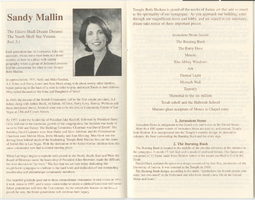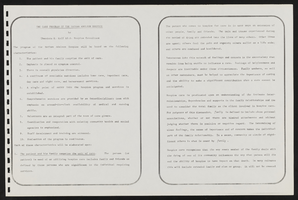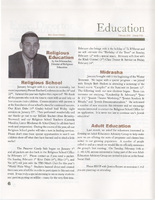Search the Special Collections and Archives Portal
Search Results

Invitation and program for Temple Beth Sholom building dedication, September 2000
Date
Archival Collection
Description
Temple Beth Sholom invitation and program for the building dedication includes a guide to the Judaic art in the synagogue and a list of past presidents.
Text

Program for the Design and Operation of The Nathan Adelson Hospice, circa 1980
Date
Archival Collection
Description
A program for the design and operation of The Nathan Adelson Hospice in Las Vegas, Nevada. Included in the program are several appendices on functions, regulations, services, and standards, along with several pages on establishing goals for the hospice. Pages near the end include hand-drawn diagrams and several monetary finance charts.
Text
Roen, Allard, 1921-2008
Allard Frank Roen, age 87, of La Costa in Carlsbad, CA passed away on Thursday, August 28, 2008, succumbing to complications of heart disease. He was born May 8, 1921, in Cleveland, Ohio, and was a resident of La Costa for 41 years. Allard graduated Duke University in 1943 with a degree in business. He served as a lieutenant in the United States Navy from 1943 thru 1946; participating in the Gilbert Islands and Okinawa campaigns. Following his discharge in 1946, Allard worked in Palm Beach, Florida, as a hotel contractor and builder.
Person

Transcript of interview with Morris "Moe" Dalitz by Brenda Baxter, November 4, 1977-March 30, 1978
Date
Description
Interview with Morris "Moe" Dalitz by Brenda Baxter, on several dates in late 1977 to early 1978. In this interview, Dalitz talks about his business and career endeavors before coming to Las Vegas, which included a laundry service and military service. Dalitz partnered with Wilbur Clark and became a successful hotel and casino owner in Las Vegas, as well as a real estate developer with properties including the Boulevard Mall and Sunrise Hospital.
Moe Dalitz was born in Boston in 1899, and soon after his family moved to Detroit, Michigan and where his father started a linen supply company. In 1930, during Prohibition, Moe moved to Cleveland, Ohio and he became involved with the then-illegal liquor business. At the age of 41, Dalitz enlisted in the Army and was stationed at Governors Island. Moe was put in charge of laundries and dry cleaning because of his experience in the laundry business. He played an important role in creating mobile laundry units that were used in the front lines in North Africa. His ingenuity won him a non-combatant award for his "unusual interest, ingenuity and talents" applied during his service. At the end of war, Moe returned to Cleveland, where his partners were successfully carrying on their business. It was then that they decided to go into the casino-nightclub business, opening nightclubs in Ohio and Kentucky. A couple years later, Moe and his partners met Wilbur Clark and agreed to finance his inactive project in Las Vegas. Thus, in 1950, the Desert Inn Hotel and Casino opened, and Moe Dalitz ushered in a new era for the city. Moe and partners continued to elevate the sophistication of the Strip when they acquired the operating lease to, and later part ownership of, the Stardust Hotel and Casino. Moe was instrumental in bringing the French Lido de Paris show to the Stardust, which was considered the most spectacular nightclub show produced in Las Vegas at its time. In addition to his gaming industry ventures, Moe engaged in significant real estate development, along with partners Allard Roen, Merv Adelson and Irwin Molasky. Their projects included Sunrise Hospital, The Boulevard Mall and Las Vegas Country Club as well as La Costa Resort and Spa in California. At the time of the interview, Moe was involved with the construction of a downtown hotel and casino. Moe Dalitz was the recipient of the Humanitarian Award from the American Cancer Research Center, and supported the Variety Club and the Home of the Good Shepard, amongst other charities.
Text
Benedict Family Papers
Identifier
Abstract
The Benedict Family Papers materials date from roughly 1905-1998 and are comprised of correspondence and letters (1969-1971) written to Howard Hughes by the public. The collection also contains correspondence written to Robert Maheu, former chief executive of Nevada operations for Howard Hughes. The collection also includes a variety of casino and gambling related product catalogs, gaming guides for Las Vegas casinos, and of research papers and reports primarily relating to sports betting and cheating.
Archival Collection

Richard C. MacDonald interview, September 20, 2016: transcript
Date
Archival Collection
Description
Henderson developer and Philadelphia native Richard MacDonald is a natural storyteller, and he has stories to tell. The man behind MacDonald Highlands and the Dragon Ridge Country Club first moved to Las Vegas as a young teen with his parents in 1959. After graduating Las Vegas High School in 1963, his parents moved to Hawaii and he enrolled at Nevada Southern University (now UNLV) and supported himself in Las Vegas by selling unfinished houses. His parents convinced him to move to Hawaii, where he attended the University of Hawaii worked with his father selling blocks of pre-developed cemetery lots to Asian buyers. In this interview, MacDonald describes his experience as a white man facing racial discrimination, of Las Vegas as Hawaii's Ninth Island, of earning his real estate broker's license, and of his father's plan to develop and sell Las Vegas property to Hawaiians. Returning to Las Vegas, MacDonald worked with Frank Sala and Chuck Ruthe to obtain his first two sections of Henderson land, which became Sun City MacDonald Ranch and the western part of MacDonald Highlands. He talks of developing Sunridge at MacDonald Ranch on Eastern Avenue and The Canyons at MacDonald Ranch. He also speaks to local prejudice against Hawaiians and to the way the City of Henderson favored Hank Greenspun and American Nevada Corporation. He recalls his twenty-year experience as a developer with the City of Henderson, its planning commission, city manager, city attorney, and city council. He reveals associations with Del Webb and the Del Webb CEO, Anthem, the Bureau of Land Management (BLM), the Sultan of Brunei, and polo fields as well as Red Alerts, the Foothills project, and MacDonald Highlands. Along the way he talks of golf course architects and planners and the MacDonald Highlands golf course, his family, the Great Recession, and his current status with the City of Henderson and the Archaeological Institute of America.
Text

Brian Greenspun interview, 2018: transcript
Date
Archival Collection
Description
Interviewed by Barbara Tabach. Publisher of Las Vegas Sun, child of Hank and Barbara Green. Part 1 Subjects: Las Vegas Sun, Greenspun family, Israel gun running; Part 2 subjects: Journalism importance, Las Vegas Sun, Watergate tie-in with Hank's safe, October 1 shootings reflections; Part 3 subjects: Hank and Barabara Greenspun. Talks about Jewish visionaries of Las Vegas that includes Art Marshall, Jack Entratter, Sheldon Adelson, Nate Mack; Part 4: Interviewed by Barbara Tabach. Las Vegas Sun newspaper publisher and native Las Vegan talk about events and people from Las Vegas' years of him growing up. From watching pink smoke from test site to hanging out with friends in the John S. Park neighborhood to racial riot of 1969 to playing golf as a kid.
Text

Transcript of interview with Walter Weiss by Claytee White, November 2, 2010
Date
Archival Collection
Description
In this interview, Walter Weiss discusses how Judaism and boxing kept him out of trouble in his youth. Weiss grew up in the Boston area, and started boxing as a teenager. Weiss talks about his boxing training, becoming a runner for a bookmaker, and coming to Las Vegas in the 1950s to be a bookmaker for the Stardust Hotel, and working the slot machine floor. He had several different jobs in various casinos, and discusses different people involved in the gaming industry in Las Vegas.
Walter Weiss life story begins in a Malden, Massachusetts during the Great Depression. His early background was a blend of observant Judaism, secularism, and the effects of the era. He was a troubled youth whose older brother encouraged him to join him in boxing. As Walter explains: I was a wild kid and ... boxing saved my life. His aptitude for boxing led him to be a sparring partner in New York City's famous Spillman Gym. There he met and worked out with some of the greatest fighters of the era, including Rocky Marciano. He recalls how he turned professional while attending the University of Miami and how he first came to Las Vegas in 1958 to escape his personal troubles and find work with a local bookmaker. Thus began his diverse employment history in the casino industry. He details his various positions and the cast of famous and infamous characters of the times. For six years he return to New York and worked as a Wall Street broker before arriving back in Las Vegas in 1973. He talks about his property ownership, lobbying for an amendment to Senate Bill 208, his personal religious changes and a sundry of observations about the changes that occurred as the state took over gaming.
Text

